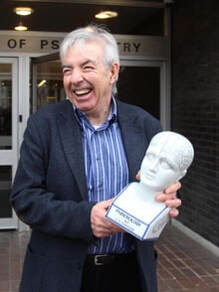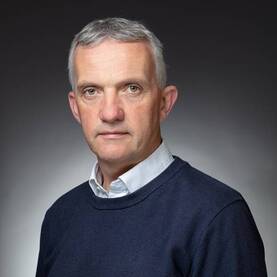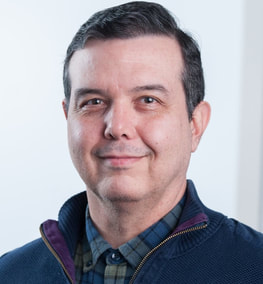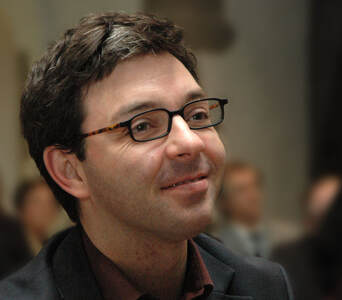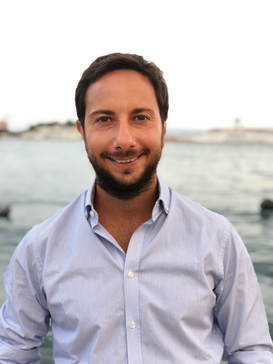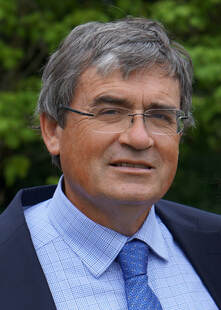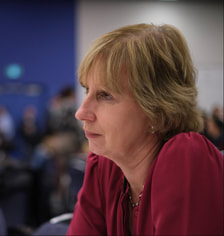Prof Robin Murray
Sir Robin Murray is Professor of Psychiatric research at the Institute of Psychiatry and is concerned with finding the causes of psychosis, and improving its treatment. His early work challenged the prevailing view of schizophrenia as an adult-onset brain disease, instead demonstrating that it is in part a neurodevelopmental disorder. He and his colleagues have shown that that environmental factors such as obstetric events, childhood adversity, migration, and heavy cannabis use are all risk factors for psychosis. Robin is the most widely cited schizophrenia researcher outside the USA and was knighted by the Queen in 2011. He is one of only four psychiatrists ever to be elected to the UK Royal Society.
Dr Marta Di Forti
Marta Di Forti is a MRC senior clinical scientist and Reader at the Institute of Psychiatry, King's College London. Her work identified an increased risk of psychosis following use of high-potency cannabis, particularly in adolescence. The clinical population she cares for comprises young people suffering from their first episode of psychosis. Her clinical work plays a crucial role in informing and inspiring her academic interests. Marta currently researches the interaction between genes and cannabis in causing psychotic disorders and worsening the outcome.
Prof Anton Grech
Dr. Anton Grech graduated as Doctor of Medicine from the University of Malta in 1992. He became a Member of the Royal college of Psychiatrists, UK, in 1997, and he became a Fellow of the same college in 2011. In 1999 he obtained an M.Sc. in Psychiatry from King’s College, University of London. He trained and worked at the Maudsley Hospital in London, between 1994 and 1998. During 1998 he was also a Clinical-Academic Lecturer in the Department of Psychiatry, Institute of Psychiatry, King’s College, University of London. Between 1999 and 2002 he was Honorary Researcher within the same Department. In 1999 he proceeded to Malta, where he was Senior Registrar in Psychiatry until 2003, when he was appointed Consultant Psychiatrist with a special interest in Addictions and Neuropsychiatry. In 2000 he was appointed Lecturer in Department of Psychiatry of the Faculty of Medicine and Surgery of the University of Malta, and in 2008 he was appointed as Senior Lecturer within the same Department. In 2011 he was appointed as Senior Research Fellow in the Bedfordshire Centre for Mental Health Research in association with the University of Cambridge, United Kingdom. In 2011 he was also appointed as Clinical Chairman of the Department of Psychiatry in the Ministry of Health, Malta. His main research is on the aetiology of schizophrenia, and it was based at the Institute of Psychiatry London and at the University of Malta. He has published in international psychiatric journals, and presented and chaired in international psychiatric conferences. In 2008 he was chosen as one of the 30 European Scientists to be featured in the book ‘Portraits of Science; Scientists of Tomorrow’, published by the European Federation of Pharmaceutical Industries and Associations, to commemorate its 30 th anniversary. In 2013 he was appointed Chairman of 'Fundazzjoni Kenn Ghal Sahhtek', a foundation in collaboration between Community Chest Fund and the Government of Malta. He is a member of various national boards and commissions. He believes a lot in using the media to educate on mental health, and for the last years in Malta he conducted radio and TV programmes on issues related to mental health.
Prof Fiona Gaughran
Fiona Gaughran is Professor of Physical Health and Clinical Therapeutics in Psychiatry at the Institute of Psychiatry, Psychology and Neuroscience, King’s College London and the Director of Research and Development at the South London and Maudsley NHS Foundation Trust, where she is the Lead Consultant for the National Psychosis Service. She is also the Theme lead for Applied Informatics in the NIHR Applied Research Collaboration in South London. Professor Gaughran holds fellowships of the Royal Colleges of Physicians in London, Edinburgh and Dublin and the Royal College of Psychiatrists. Her research interests are largely focused on the interface between physical health and serious mental illness and on the management of psychosis. Since 2020, Professor Gaughran has been on the Clarivate Highly Cited Researchers list, meaning she ranks among the top 1% most cited for her subject field and year of publication.
Prof Donald O'Shea
Qualified from University College Dublin in 1989 and then moved to Hammersmith Hospital in London. Completed research with Professor Sir Stephen Bloom on how the brain controls appetite. Moved to current position in 1999 establishing 2 hospital based multidisciplinary treatment teams for the management of adult obesity and gender dysphoria. Is a member of the Department of Health Policy group on obesity established in 2011 and chaired a group carrying out a health impact assessment on the potential benefits and harms of a tax on sugar sweetened drinks. Has presented the EU Ministers for Health and the Director General of the WHO on the importance of prevention of childhood obesity. Has specific research interests in obesity and gender identity and has published over 250 research papers. He is currently the National lead for management of Obesity with the Health Service Executive in Ireland.
Prof Diego Quattrone
Diego Quattrone is a Consultant Psychiatrist at the Maudsley Hospital and has spearheaded the Inpatient and Crisis Services for the Lewisham Operations Directorate. He also serves as an Associate Professor of Psychiatry at the University of Palermo and Senior Lecturer at King's College London.
Diego oversees the Psychiatric Intensive Care Unit (Johnson PICU), specializing in delivering comprehensive care and treatment to patients in the most acute stages of their psychiatric illness. Notably, Johnson PICU was recognized as a finalist at the HSJ Patient Safety Awards for its contribution to 'Changing Culture,' driving enhancements in culture and quality throughout the UK's National Health System.
Diego's research interests are deeply rooted in his clinical experience and focus on the epidemiology and genetics of psychopathology associated with cannabis use and addiction. He is currently investigating how biological variations in the endocannabinoid system render certain cannabis users susceptible to developing psychosis, violence, and aggression.
Diego oversees the Psychiatric Intensive Care Unit (Johnson PICU), specializing in delivering comprehensive care and treatment to patients in the most acute stages of their psychiatric illness. Notably, Johnson PICU was recognized as a finalist at the HSJ Patient Safety Awards for its contribution to 'Changing Culture,' driving enhancements in culture and quality throughout the UK's National Health System.
Diego's research interests are deeply rooted in his clinical experience and focus on the epidemiology and genetics of psychopathology associated with cannabis use and addiction. He is currently investigating how biological variations in the endocannabinoid system render certain cannabis users susceptible to developing psychosis, violence, and aggression.
Prof Caterina (Erika) La Cascia
Caterina La Cascia (Erika), is a clinical psychologist, PhD in neuroscience and behavioral disorders, and associate professor at Department of Experimental Biomedicine and Clinical Neuroscience in University of Palermo. She works also as a clinical psychologist and psychotherapist at Unit of Psychiatric of University Hospital of Palermo. Her main interest in research is in Psychosis, particularly in use of cannabis and psychosis onset, and in psychiatric rehabilitation.
Laura Stack
Laura Stack had flown 2 million miles around the world as a bestselling author of 8 books, until her world suddenly changed on Nov. 20, 2019, when her 19-year- old son, Johnny, died by suicide. He had become psychotic from dabbing high-THC marijuana concentrates. She responded by forming the nonprofit, Johnny’s Ambassadors Youth Marijuana Prevention, to educate teens and parents about the dangers of marijuana on brain development, mental illness, and suicide. Johnny’s story has been told in People Magazine, the New York Times, the Wall Street Journal, PBS, and on Dr. Phil. Laura is on a crusade to recruit thousands of Johnny’s Ambassadors to get teens to #StopDabbing.
Prof Laura Ferraro
Laura Ferraro is a PhD in Clinical Medicine and Behavioural Sciences and a Psychologist and Cognitive Psychotherapist. She has been working in the research field until July 2009 when she started her four-years research fellowship grant in schizophrenia research at University of Palermo, where she is currently working as a teacher. She is interested in psychosis, particularly in cannabis use, cognition, and premorbid adjustment.
Dr Mario Juruena
Dr Juruena is currently a Clinical Reader in Translational Psychiatry at the Institute of Psychiatry, Psychology and Neuroscience, Centre for Affective Disorders, Dept of Psychological Medicine at King’s College London, UK.Dr Juruena is a Consultant Psychiatrist at South London and Maudsley NHS Foundation Trust (SLaM) and National Affective Disorder Service (NADS), currently the lead consultant for the Maudsley Advanced Treatment Service for Difficult to treat Depression and Bipolar Disorders (MATS/ SLaM).He graduated in Medicine (MD) from Pontifical Catholic University, Southern Brazil. Dr Juruena completed his Psychiatry Training at the Saint Peter Hospital/ Public Health School and received his MPhil in Psychobiology at the Federal University of Sao Paulo and then MSc in Affective Neuroscience at Maastricht University in the Netherlands. He has also completed Cognitive Psychotherapy Training at Beck Institute (Dip CBT), Philadelphia, USA. Dr Juruena completed his PhD in Treatment-Resistant Depression and Stress Hormones at the University of London/King’s College London in 2007. Dr Juruena has published over 150 original research articles, reviews and book chapters, and edited five books. Most of his studies are related to the Neurobiology, Diagnosis and Treatment of Affective disorders (Depression and Bipolar); and their relationship to Stress.Dr Juruena was awarded by the British Association for Psychopharmacology ‘The Senior Clinical Psychopharmacology Award’ and received the ‘Robert W. Kerwin Psychopharmacology Prize’ from the Royal College of Psychiatrists for the best article published on the subject in the British Journal of Psychiatry. In addition, he was recently awarded the Newton Research Fellow from the Royal Society and Academy of Medical Sciences.
Dr Sameer Jauhar
Dr Jauhar graduated in Medicine from Glasgow University in 2002, having also completed a degree in Public Health and Epidemiology.
He moved to the Institute of Psychiatry in 2012, to work with Oliver Howes and Shitij Kapur on predominantly PET studies of the dopamine system, with the focus on psychosis and treatment response.
His research interests focus on understanding neurobiological causes of psychotic illness, with a focus on the affective psychoses, and treatment of psychotic and affective illnesses.
He has received travel awards/grants from the European Psychiatric Association, European Congress of Neuropsychopharmacology, British Association fpr Psychopharmacology, and Schizophrenia International Research Society.
He received a Royal College of Physicians, Edinburgh JMS Sim Fellowship in 2018, enabling him to build on work examining the presynaptic dopamine system in affective psychoses.
In 2019 he was awarded the Senior Clinical Award from the British Associaiton for Psychopharmacology, and in 2022 the Rafaelson Young Investigator Award from the International College of Neuropsychopharmacology.
Clinically, he has worked as a Consultant Psychiatrist in Early Intervention in Psychosis since 2012, throughout South London and Maudsley NHS Trust.
He moved to the Institute of Psychiatry in 2012, to work with Oliver Howes and Shitij Kapur on predominantly PET studies of the dopamine system, with the focus on psychosis and treatment response.
His research interests focus on understanding neurobiological causes of psychotic illness, with a focus on the affective psychoses, and treatment of psychotic and affective illnesses.
He has received travel awards/grants from the European Psychiatric Association, European Congress of Neuropsychopharmacology, British Association fpr Psychopharmacology, and Schizophrenia International Research Society.
He received a Royal College of Physicians, Edinburgh JMS Sim Fellowship in 2018, enabling him to build on work examining the presynaptic dopamine system in affective psychoses.
In 2019 he was awarded the Senior Clinical Award from the British Associaiton for Psychopharmacology, and in 2022 the Rafaelson Young Investigator Award from the International College of Neuropsychopharmacology.
Clinically, he has worked as a Consultant Psychiatrist in Early Intervention in Psychosis since 2012, throughout South London and Maudsley NHS Trust.
Prof Anita Thapar
Anita Thapar is a clinician scientist. Her primary interests are in child neurodevelopmental disorders and depression. She was Lead Editor (Joint) of the 6th Edition of Rutter’s Child and Adolescent Psychiatry-the leading textbook for clinicians and scientists.
She heads the academic Child and Adolescent Psychiatry Section in the Division of Psychological Medicine and Clinical Neurosciences and the developmental disorders group within the MRC Centre for Neuropsychiatric Genetics and Genomics and Division. I also have honorary NHS consultant contracts with Cwm Taf and Cardiff and Vale UHBs.
Her wider roles include:
Teaching/training of medical and psychology/biomedical students and trainee NHS clinicians
NHS liaison
Translation of our research into policy including Welsh Government Together for Children and Young Peoples Programme on child and adolescent mental health (neurodevelopmental and early help and enhanced support work streams).
She is also on the board of the UK national neurodiversity charity ADHD Foundation.
She heads the academic Child and Adolescent Psychiatry Section in the Division of Psychological Medicine and Clinical Neurosciences and the developmental disorders group within the MRC Centre for Neuropsychiatric Genetics and Genomics and Division. I also have honorary NHS consultant contracts with Cwm Taf and Cardiff and Vale UHBs.
Her wider roles include:
Teaching/training of medical and psychology/biomedical students and trainee NHS clinicians
NHS liaison
Translation of our research into policy including Welsh Government Together for Children and Young Peoples Programme on child and adolescent mental health (neurodevelopmental and early help and enhanced support work streams).
She is also on the board of the UK national neurodiversity charity ADHD Foundation.
Prof Graham Murray
Graham Murray is Associate Professor in the Department of Psychiatry and Behavioural and Clinical Neuroscience Institute at University of Cambridge. He studied Physics and Philosophy at Oxford, Medicine at King’s College London, and postgraduate psychiatry in Cambridge. He has a doctorate in cognitive epidemiology from University of Oulu in Finland, and a doctorate in cognitive neuroscience from University of London. In his clinical work Dr Murray is Consultant Psychiatrist in the Cambridge early psychosis service, CAMEO. He draws on a variety of research methods, including brain imaging, population neuroscience, psychopharmacology, and computational psychiatry. His current research is focused on delineating the causal pathways from schizophrenia risk factors to pathophysiology, and elucidating the brain mechanisms of delusions and hallucinations.
Dr Isabelle Austin-Zimmerman
Isabelle Austin-Zimmerman is a postdoctoral research associate at King’s College London. Her work focuses on understanding the genetic relationship between cannabis use and psychosis. Prior to joining King’s, Isabelle completed her PhD at UCL investigating pharmacogenetic variation in response to antidepressants and antipsychotics.
Prof Giovanni De Girolamo
Giovanni de Girolamo is the former Scientific Director and the Head of the Unit of Epidemiological Psychiatry at the IRCCS Istituto Centro San Giovanni di Dio in Brescia, Italy, leading clinical research centre in mental health located in Northern Italy. He is also Professor of Psychiatry at the Catholic University of Sacred Heart in Milan. From 1988 to 1994, he worked at the Division of Mental Health of WHO in Geneva under the guidance of Norman Sartorius. From 1998 to 2001 he was the coordinator of the National Mental Health Project, based at the Italian N.I.H. in Rome, which involved 27 specific research projects and more than 100 centres throughout Italy. He has set up and directed several large multicentre projects, including PROGRES, PROGRES-Acute, WHO World Mental Health Survey Initiative (Italian site), PREMIA, MILESTONE, VIORMED, EU-VIORMED, INTERPRET-DD project and DIAPASON. His research focuses on psychiatric epidemiology and health services research, schizophrenia, early interventions and forensic psychiatry. He is the co-author of 503 publications, including 41 volumes or monographs, 388 articles (281 indexed in Pubmed), and 76 book chapters. He has an H-index of 87 (Scopus, February 2022)
Dr Giuseppe Maniaci
Giuseppe Maniaci is a PhD in Neuroscience and Behavioral Disorders, a Clinical Psychologist and a Psychotherapist. He works at the Department of Experimental Biomedicine and Clinical Neuroscience at University of Palermo. His main research fields concern the assessment and treatment of gambling disorder, the association between unhealthy lifestyles and psychiatric disorders and the evaluation of the outcome of psychological therapies.
Prof Giovanni Martinotti
Giovanni Martinotti is Associate Professor at the University “G. d’Annunzio” Chieti-Pescara, Italy, Scientific Director of the SRP Villa Maria Pia, Rome and Head of the Emerging Drugs and Brain Stimulation Unit, Department of Neuroscience, Imaging, Clinical Sciences at the Institute for Advanced Biomedical Technology in Chieti.
He studied medicine at the Università Cattolica del Sacro Cuore (Rome), specialising in psychiatry, followed by a PhD in Neuroscience. His post-graduate research focuses on addiction psychiatry, with specific interests in treatment-resistant depression, dual diagnosis, complications and sequelae of addiction, pharmacological treatment of addictive disorders, brain stimulation techniques, novel psychoactive substances, and psychedelics. He has clinical experience in the UK, Spain and Brazil.
He has authored more than 300 scientific manuscripts. He was President of the Young Section of the Italian Psychiatric Association (2012-2020) and, since 2015, he has been Secretary of the World Psychiatric Association (WPA) section of Ecology, Psychiatry & Mental Health.
He studied medicine at the Università Cattolica del Sacro Cuore (Rome), specialising in psychiatry, followed by a PhD in Neuroscience. His post-graduate research focuses on addiction psychiatry, with specific interests in treatment-resistant depression, dual diagnosis, complications and sequelae of addiction, pharmacological treatment of addictive disorders, brain stimulation techniques, novel psychoactive substances, and psychedelics. He has clinical experience in the UK, Spain and Brazil.
He has authored more than 300 scientific manuscripts. He was President of the Young Section of the Italian Psychiatric Association (2012-2020) and, since 2015, he has been Secretary of the World Psychiatric Association (WPA) section of Ecology, Psychiatry & Mental Health.
Prof Nadia Micali
Nadia Micali, MD, MRCPsych, PhD, FAED, is Head of research and founder of the Center for Eating and feeding Disorders research (CEDaR) at the Specialist center for Eating Disorders of the Capital Region of Denmark, and Professor of Psychiatry at the University of Copenhagen, Denmark. CEDaR focuses on research in risk factors, genomics, epidemiology, neurobiology, and treatment of feeding and eating disorders; integrating different research methods. Prof Micali is a child and adolescent psychiatrist, specialist in eating disorders.
Over the course of her career, Dr. Micali has written over 180 peer reviewed papers. In the last 15 years Dr. Micali’s research has focused on understanding biological and intergenerational risk for eating disorders using a developmental perspective. The impact of Dr. Micali’s research is underscored by her role as associate editor on journals in the field, including European Eating Disorders review, and British Journal of Psychiatry Open. She has several research collaborations across Europe and the US. She currently serves as an elected executive board member on the Eating Disorders Research Society (for which she served as president in 2015); she served on several committees of the Academy of Eating Disorders between 2005-2020. Dr. Micali’s contributions to the field of eating disorders have been recognized by several awards, most notably a Leadership award in research in eating disorders from the Academy of Eating Disorders in 2022, her election as 2015 President of the Eating Disorders Research Society, and several prizes.
Over the course of her career, Dr. Micali has written over 180 peer reviewed papers. In the last 15 years Dr. Micali’s research has focused on understanding biological and intergenerational risk for eating disorders using a developmental perspective. The impact of Dr. Micali’s research is underscored by her role as associate editor on journals in the field, including European Eating Disorders review, and British Journal of Psychiatry Open. She has several research collaborations across Europe and the US. She currently serves as an elected executive board member on the Eating Disorders Research Society (for which she served as president in 2015); she served on several committees of the Academy of Eating Disorders between 2005-2020. Dr. Micali’s contributions to the field of eating disorders have been recognized by several awards, most notably a Leadership award in research in eating disorders from the Academy of Eating Disorders in 2022, her election as 2015 President of the Eating Disorders Research Society, and several prizes.
Prof Andrew Scull
Andrew Scull is Distinguished Research Professor at the University of California, San Diego. He obtained a B.A. with first class honours at Balliol College, Oxford, a Ph.D from Princeton University, and undertook post-doctoral studies in medical history at University College London. He has held fellowships from (among others) the Guggenheim Foundation and the American Council of Learned Societies, and is a past president of the Society for the Social History of Medicine.
He has written and published extensively on the history of psychiatry for almost a half century. Two of his most recent books are: Madness in Civilization: From the Bible to Freud, and from the Madhouse to Modern Medicine and Desperate Remedies: Psychiatry and the Mysteries of Mental Illness
He has written and published extensively on the history of psychiatry for almost a half century. Two of his most recent books are: Madness in Civilization: From the Bible to Freud, and from the Madhouse to Modern Medicine and Desperate Remedies: Psychiatry and the Mysteries of Mental Illness
Prof Cathryn Lewis
Cathryn Lewis is Professor of Genetic Epidemiology & Statistics at King’s College London, and Head of Department at the Social, Genetic and Developmental Psychiatry Centre. She is an Executive Director of the Psychiatric Genomics Consortium and co-chairs the Major Depressive Disorder Working group. She has published over 400 papers on statistical genetics analysis and methodology for complex disorders. Her academic training is in statistics, and which she applies to genetic studies. Her research identifies and characterises the genetic contribution to human disease, with a focus on polygenic scores, psychiatric disorders and pharmacogenetics.
